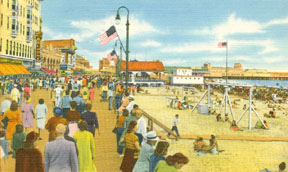
|
Keep Sweet! |
|
A Memoir by the Late Dr. Roy Sheppard Minerd - Part 8 of 12 |
Last month: The orphan Dawson, under Roy S. Minerd's mentorship, learns not to run away from his problems, but rather to face them head-on. Another boy reveals how his mother had completely abandoned him, causing Roy to rage over such cruel and barbarous behavior, but also to share the joy that his own beloved mother had brought him. Roy tells how a third boy, Dick, whose parents were horribly negligent, had been discharged from the Home, and adopted out to a farmer, with disastrous consequences.
The papers were made out and the boy legally adopted. Under the management of the Home, no one under their guardianship is placed out even temporarily without the most careful investigation to the most minute detail, but Dick was no longer under their direction.
It developed shortly that the old farmer was a confirmed drunkard and had liquor about the house and barn all the time. Coming upon it as he did, Dick with his heredity and a normal boy's curiosity, began to meddle with it and soon it got him so that he was found intoxicated repeatedly.
Those who were in this vicinity on the Saturday preceding Easter, 1914, recall the terrific blizzard of that day and remember that in some places there were drifts many feet deep. Late that afternoon Dick started for the barn to feed. He was drunk. Can you imagine it? Not yet 18 and a drunkard!
 |
| Discharged from the Home, in care of a drunken farmer, "Dick" froze to death in a snow drift |
He did not return, nor did they hear of him for two weeks. The old man made no inquiry nor did he report to the authorities, the boy's father, or the Home. Two weeks after his disappearance, the farmer's horse shied at something by the roadside near the barn. Getting out of the rig to see what frightened the horse, the old man found Dick's body partly hidden in the melting drift, where he had fallen in the storm while he was too drunk to help himself. There he lay as he fell and slowly froze to death.
It is too horrible an event to comment upon or to need comment. Such things we read of as the basis of fiction. Would to God it were only fiction, but it is not! I had the story from those who know and also from the lips of his own brother, Tom.
But Tom is our biggest problem. A year or more since, he went to work in the H.--- Hospital in Philadelphia, where he stayed, altho still under the guardianship of the Home. Fortunately his work began at 6 p.m. so that his evenings were not his. One who is of his turn, having been under the discipline of an institution -- in at a certain hour, to bed at a certain time, etc., and out running around in the evenings, not at all, -- and being used to such restraint for 11 years, till his 16th year of age, has a tendency, when once released from such restraint, to permit the pendulum to swing to the other extreme, so that the salvation of Tom at first was his night work. But there was the 'phone with an operator at the central end who was willing to talk with anyone. Stopping one evening to see him I heard as I stepped to the window, "I'm busy now dearie, but I'll call later." I watched closely and at my first opportunity I spoke to him as tactfully as I could about loose girls and his inquiries opened the subject of adolescence and its problems, about all of which I found him as woefully ignorant as a baby.
You may think that the talking to an operator in such a manner is nothing. But just a moment! Would it be nothing if it were your boy -- a boy with a home and a heredity that gave him something besides passion, lust selfishness, drunkenness, brawling and quarreling? What of it, then, when the boy includes all these and perhaps more in his temperament? This with the aforementioned restraint makes the proposition all the more delicate to handle.
His main difficulty, however, seems to be a desire to spend every cent he gets and then go in debt for more. He is paid unusually well for a boy of his age and attainments, but never has a cent left from one pay to the next unless Miss S. at the Home demands a certain sum when he is paid and banks it for him. Then she is tormented continually for it to be used for this or that. He must sport himself as finely and expensively as anyone he sees regardless of cost and this summer his vacation must be spent at Atlantic City -- two weeks of it -- and this was planned and room engaged while Miss S. was away or he would not have gone.
|
|
|
New York City skyline |
His salary is $25 per month with board, room and laundry, yet he had to have clothes, a new bathing suit -- the very best -- and all that goes with such a trip before leaving and the night before he left he told me had had but $20 for two week's board and carfare! Went to Atlantic City for one day and spent $10, earlier in the year. Did a similar stunt on a trip to New York, and because Miss S. refused to give him his balance from the bank, he raised a terrible fuss. I tried to show him that we were giving him of our experience and observation, but his reply was:---
"You and others have had your chance and lots have come out alright; now let me have mine and find out for myself. I'm willing to take my chances. Don't I have the same chance that the rest have had to get thru alright?"
"No," I replied. "You have more to fight than the ordinary individual." And he well knew to what I referred.
"Well, I'll risk it. Just wait till I'm 18 and free from this Home (forgetting all it had been to him for so many years) and I'll bet I'll raise the devil and do as I please once in a while."
In such a mood, nothing but silence will avail so I sadly turned away.
He went to the shore and when he returned he swaggered up before Miss S. with:
"Gee but I had a time! Stayed at a swell hotel, went out bathing and boating, got drunk once and flirted with all the pretty girls around."
Miss S. made no reply. This got him.
"Well, aren't you going to say anything?"
"I have stopped being surprised at anything you do," was her quiet reply.
This attitude was taken because the night before he went to the shore, she had been told that one who had done a great deal for Tom and was deeply concerned in his welfare, had, some months before on account of certain conditions, given Tom some money to make a payment on some goods at an establishment near the hospital. He had put off delivering the receipts altho he had had several chances, and finally when a statement was received by the person in question asking for a payment on the goods long since supposedly paid for, he finally acknowledged to his having used the money. He gave as his excuse: "I wanted the money and I didn't think he'd care."
I need not say that I was terribly upset when I heard of it. I was completely stumped. But worse than that, he promised to make it up on the first of September, and yet when he went to Atlantic City on the 9th, it was still unpaid.
 |
|
Boardwalk and beach at Atlantic City |
"If I have any left when I come back I'll pay it!" It was only $4.50 but the principle concerned was the point. And his unconcerned attitude was the aggravating part about it. Then it was that it was reported to Miss S. whose first thought was to demand it from him the next morning -- the day he was to leave -- which would have compelled him to stay home and spend his vacation in a more sane way for a boy of his temperament and circumstances.
Certainly he "hadn't any left" when he returned but as the treasurer of the Home -- a wonderful man -- and the Board of Managers took the matter up, the bill was paid out of his next salary and now he is allowed so much a month of his money and the remainder is turned over to the Superintendent, Miss. S., and banked for him.
The treasurer, a very prominent banker in the city, had a long interview with Tom concerning the break, and the last time I spoke to Miss S. about him she said:
"Tom is improving. I think he is trying hard to do the right."
I mention this only to make clearer the problems we have to meet and the difficulties in the way of successfully training the boys. They are discouraging, it is true, but do we not have discouragements in every line of work? And after all, isn't it the darkness that shows us the stars? Does not the Personal Workers' Band and its work stand out all the more clearly as an encouragement to push ahead, because of failures such as this, if indeed it be a failure?
Next month: With "calibre and manhood," orphan boys Jim and Arthur overcome their own private burdens -- an upbringing in a bad section of Philadelphia, as well as abusive jobs, to build self-esteem and become more productive members of society.
Copyright © 2002 Mark A. Miner
